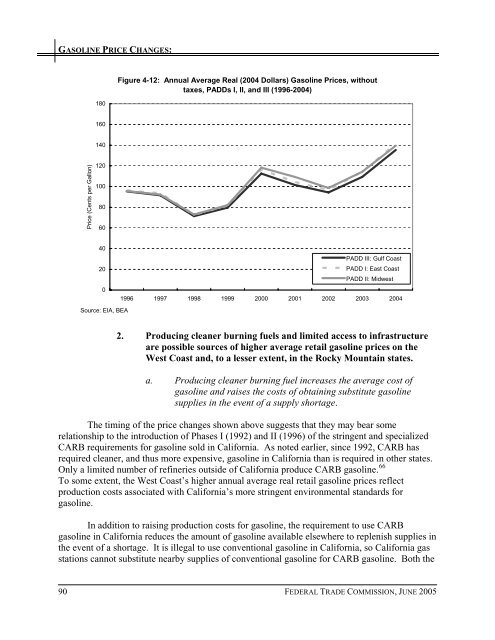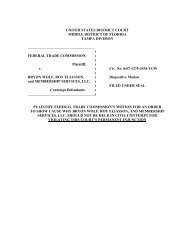Gasoline Price Changes - Federal Trade Commission
Gasoline Price Changes - Federal Trade Commission
Gasoline Price Changes - Federal Trade Commission
Create successful ePaper yourself
Turn your PDF publications into a flip-book with our unique Google optimized e-Paper software.
GASOLINE PRICE CHANGES:<br />
<strong>Price</strong> (Cents per Gallon)<br />
180<br />
160<br />
140<br />
120<br />
100<br />
80<br />
60<br />
40<br />
20<br />
0<br />
Source: EIA, BEA<br />
Figure 4-12: Annual Average Real (2004 Dollars) <strong>Gasoline</strong> <strong>Price</strong>s, without<br />
taxes, PADDs I, II, and III (1996-2004)<br />
PADD III: Gulf Coast<br />
PADD I: East Coast<br />
PADD II: Midwest<br />
1996 1997 1998 1999 2000 2001 2002 2003 2004<br />
2. Producing cleaner burning fuels and limited access to infrastructure<br />
are possible sources of higher average retail gasoline prices on the<br />
West Coast and, to a lesser extent, in the Rocky Mountain states.<br />
a. Producing cleaner burning fuel increases the average cost of<br />
gasoline and raises the costs of obtaining substitute gasoline<br />
supplies in the event of a supply shortage.<br />
The timing of the price changes shown above suggests that they may bear some<br />
relationship to the introduction of Phases I (1992) and II (1996) of the stringent and specialized<br />
CARB requirements for gasoline sold in California. As noted earlier, since 1992, CARB has<br />
required cleaner, and thus more expensive, gasoline in California than is required in other states.<br />
Only a limited number of refineries outside of California produce CARB gasoline. 66<br />
To some extent, the West Coast’s higher annual average real retail gasoline prices reflect<br />
production costs associated with California’s more stringent environmental standards for<br />
gasoline.<br />
In addition to raising production costs for gasoline, the requirement to use CARB<br />
gasoline in California reduces the amount of gasoline available elsewhere to replenish supplies in<br />
the event of a shortage. It is illegal to use conventional gasoline in California, so California gas<br />
stations cannot substitute nearby supplies of conventional gasoline for CARB gasoline. Both the<br />
90<br />
FEDERAL TRADE COMMISSION, JUNE 2005
















